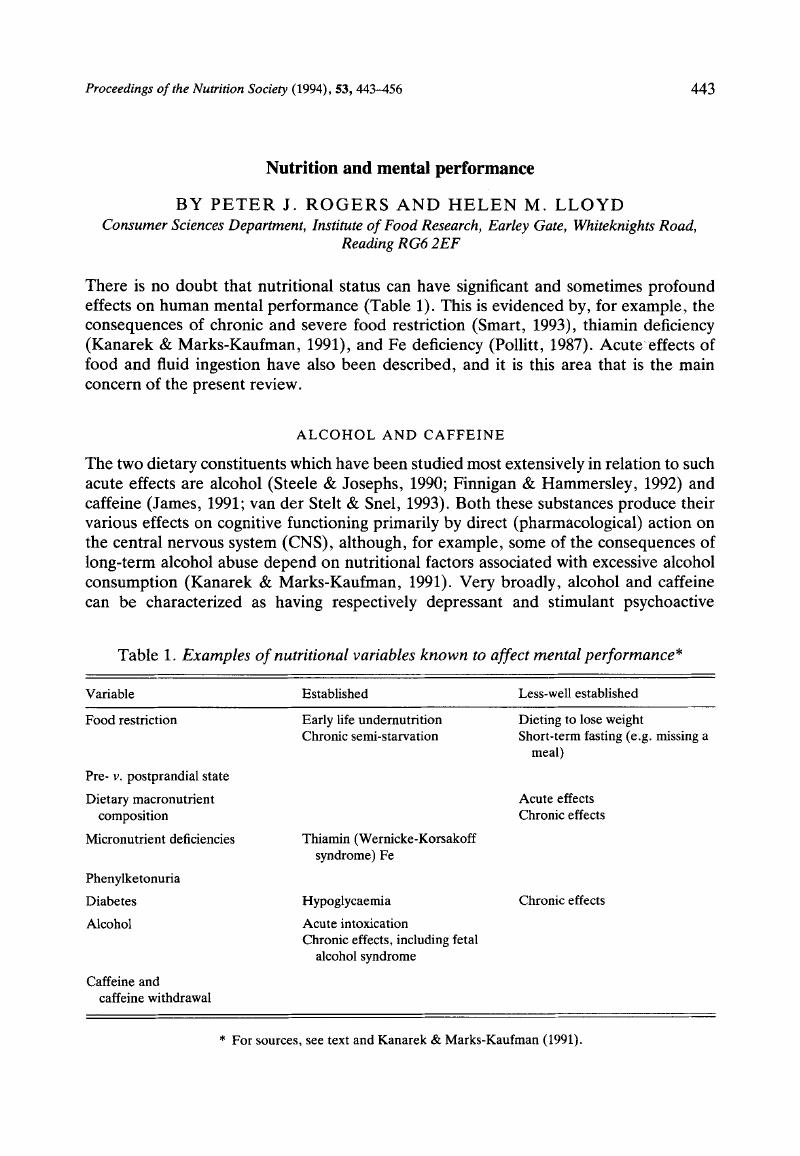Crossref Citations
This article has been cited by the following publications. This list is generated based on data provided by Crossref.
Mela, David J.
1995.
Understanding fat preference and consumption: applications of behavioural sciences to a nutritional problem.
Proceedings of the Nutrition Society,
Vol. 54,
Issue. 2,
p.
453.
Rogers, P. J.
Richardson, N. J.
and
Elliman, N. A.
1995.
Overnight caffeine abstinence and negative reinforcement of preference for caffeine-containing drinks.
Psychopharmacology,
Vol. 120,
Issue. 4,
p.
457.
Rogers, P. J.
1995.
Food, Mood and Appetite.
Nutrition Research Reviews,
Vol. 8,
Issue. 1,
p.
243.
Rogers, Peter J.
1996.
Food Choice, Acceptance and Consumption.
p.
319.
Zmarzty, S.A.
Wells, A.S.
and
Read, N.W.
1997.
The Influence of Food on Pain Perception in Healthy Human Volunteers.
Physiology & Behavior,
Vol. 62,
Issue. 1,
p.
185.
Prasad, C.
1998.
Food, mood and health: a neurobiologic outlook.
Brazilian Journal of Medical and Biological Research,
Vol. 31,
Issue. 12,
p.
1517.
Hetherington, Marion M.
and
Macdiarmid, Jennie I.
1999.
Effects of Snack Intake on Appetite, Affect and Attention.
Nutritional Neuroscience,
Vol. 2,
Issue. 2,
p.
93.
Gibson, E. Leigh
Checkley, Stuart
Papadopoulos, Andrew
Poon, Lucia
Daley, Sarah
and
Wardle, Jane
1999.
Increased Salivary Cortisol Reliably Induced by a Protein-Rich Midday Meal.
Psychosomatic Medicine,
Vol. 61,
Issue. 2,
p.
214.
Green, Michael W.
Taylor, Moira A.
Elliman, Nicola A.
and
Rhodes, Oril
2001.
Placebo expectancy effects in the relationship between glucose and cognition.
British Journal of Nutrition,
Vol. 86,
Issue. 2,
p.
173.
Leigh Gibson, E.
and
Green, Michael W.
2002.
Nutritional influences on cognitive function: mechanisms of susceptibility.
Nutrition Research Reviews,
Vol. 15,
Issue. 01,
p.
169.
Smit, H.J.
Cotton, J.R.
Hughes, S.C.
and
Rogers, P.J.
2004.
Mood and Cognitive Performance Effects of "Energy" Drink Constituents: Caffeine, Glucose and Carbonation.
Nutritional Neuroscience,
Vol. 7,
Issue. 3,
p.
127.
Smit, Hendrik J.
Grady, Melanie L.
Finnegan, Yvonne E.
Hughes, Sally-Anne C.
Cotton, Jacqui R.
and
Rogers, Peter J.
2006.
Role of familiarity on effects of caffeine- and glucose-containing soft drinks.
Physiology & Behavior,
Vol. 87,
Issue. 2,
p.
287.
Kurzban, Robert
2010.
Does the Brain Consume Additional Glucose during Self-Control Tasks?.
Evolutionary Psychology,
Vol. 8,
Issue. 2,
p.
244.
Lamport, Daniel Joseph
Dye, Louise
Mansfield, Michael W.
and
Lawton, Clare L.
2013.
Acute glycaemic load breakfast manipulations do not attenuate cognitive impairments in adults with type 2 diabetes.
Clinical Nutrition,
Vol. 32,
Issue. 2,
p.
265.
van Drongelen, Alwin
van der Beek, Allard J
Hlobil, Hynek
Smid, Tjabe
and
Boot, Cécile RL
2013.
Development and evaluation of an intervention aiming to reduce fatigue in airline pilots: design of a randomised controlled trial.
BMC Public Health,
Vol. 13,
Issue. 1,
Anjana, Yumnam
and
Reetu, Keisam
2014.
EFFECT OF FOOD INTAKE ON PAIN PERCEPTION IN HEALTHY HUMAN SUBJECTS.
Journal of Evolution of Medical and Dental Sciences,
Vol. 3,
Issue. 29,
p.
7984.
Al Hassand, NoraNasir
2015.
The prevalence of iron deficiency anemia in a Saudi University female students.
Journal of Microscopy and Ultrastructure,
Vol. 3,
Issue. 1,
p.
25.
Huckins, Jeremy F.
daSilva, Alex W.
Wang, Rui
Wang, Weichen
Hedlund, Elin L.
Murphy, Eilis I.
Lopez, Richard B.
Rogers, Courtney
Holtzheimer, Paul E.
Kelley, William M.
Heatherton, Todd F.
Wagner, Dylan D.
Haxby, James V.
and
Campbell, Andrew T.
2019.
Fusing Mobile Phone Sensing and Brain Imaging to Assess Depression in College Students.
Frontiers in Neuroscience,
Vol. 13,
Issue. ,
Eastwood, Jessica
Walton, Gemma
Van Hemert, Saskia
Williams, Claire
and
Lamport, Daniel
2021.
The effect of probiotics on cognitive function across the human lifespan: A systematic review.
Neuroscience & Biobehavioral Reviews,
Vol. 128,
Issue. ,
p.
311.
Manippa, Valerio
Lupo, Raffaella
Tommasi, Luca
and
Brancucci, Afredo
2021.
Italian breakfast in mind: The effect of caffeine, carbohydrate and protein on physiological state, mood and cognitive performance.
Physiology & Behavior,
Vol. 234,
Issue. ,
p.
113371.



